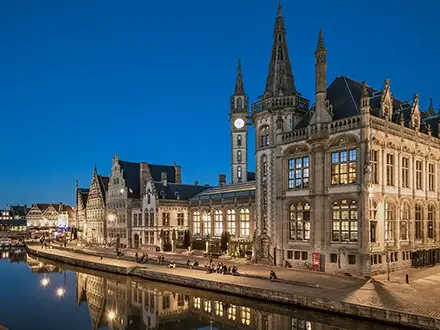
 Belgium
Belgium
- TitleColor: #333333
- DateColor: #999999
- SizeFont: 60
- FlagImg URL: /images/flags/Flag_of_Belgium.svg
- TitleImageSizes: 1900,1440,720
Belgium – Contents
General Information Toll Roads LEZ Speed Limits Petrol Parking Insurance Car Equipment TiresGeneral Information
Details about roads, speed limits, mandatory car equipment, and some traffic rules. More detailed information on toll roads, petrol prices, parking, speed limits, etc., can be found in the sections below.
| no road tolls, except for payment on specific sections (tunnels) | |
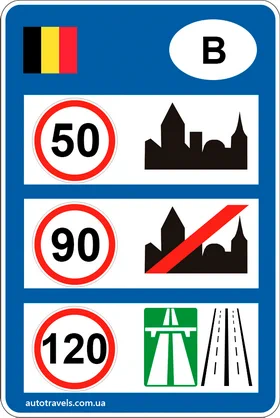 |
urban area – 50 km/h outside urban area – 90 km/h highway – 120 km/h motorway – 120 km/h dipped headlights at night and in poor visibility |
| maximum blood alcohol level 0.49 ‰ talking on the phone while driving – prohibited |
|
| winter tires mandatory, tire chains allowed only on snow or ice, studded tires prohibited |
|
mandatory equipment:
|
|
| seat belts mandatory for all passengers child seat/booster required for children under 12 years and with a height under 135 cm |
Toll Roads
No toll is required for the passage of vehicles from foreign countries on the roads of Belgium. Toll is only collected for specific sections.
Cost of Passage through the Liefkenshoek Tunnel
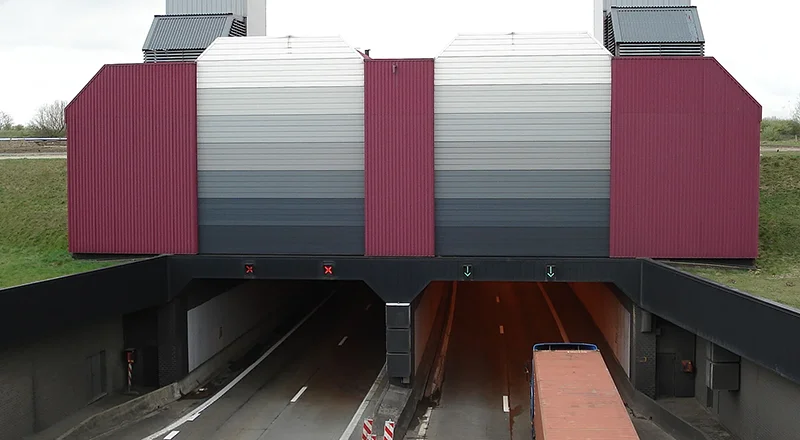
Liefkenshoek Tunnel
The Liefkenshoek Tunnel is a toll tunnel between Antwerp and Beveren under the Scheldt River. The tunnel is an extension of the R2 highway, a ring motorway that surrounds the city and the port of Antwerp. Located between Beveren Tunnel and Tijsmanstunnel, the Liefkenshoek Tunnel is the second of three consecutive automotive tunnels passing under the river and port facilities.
Liefkenshoek Tunnel on Google Maps
Payment can be made in three ways: cash, bank and fuel cards, and the Telepass system.
Below are the rates for cash and card payments.
Rates for passage through the Liefkenshoek Tunnel:
| Vehicle | Cash tariff | Card tariff | |
|---|---|---|---|
 |
Passenger car with a height of up to 3 m (Category 1) | € 7.00 | € 5.60 |
 |
Passenger car with a height of more than 3 m (06:01-21:59) (Category 2) | € 22.00 | € 19.90 |
| Passenger car with a height of more than 3 m (22:00-06:00) (Category 2) | € 7.00 | € 5.60 |

Driving in payment lanes
- Lane 1: telepass, by cards - only category 2
- Lane 2: telepass, by cards
- Lane 3: telepass, by cards
- Lane 4: telepass, by cards
- Lane 5: telepass
- Lane 6: telepass
- Lane 7: telepass, by cards - only category 1
- Lane 8: telepass, by cards - only category 1
- Lane 9: operator in manual mode, cash
Learn more about fares on tunnel Liefkenshoek web site
Low Emission Zones (LEZ) in Belgium
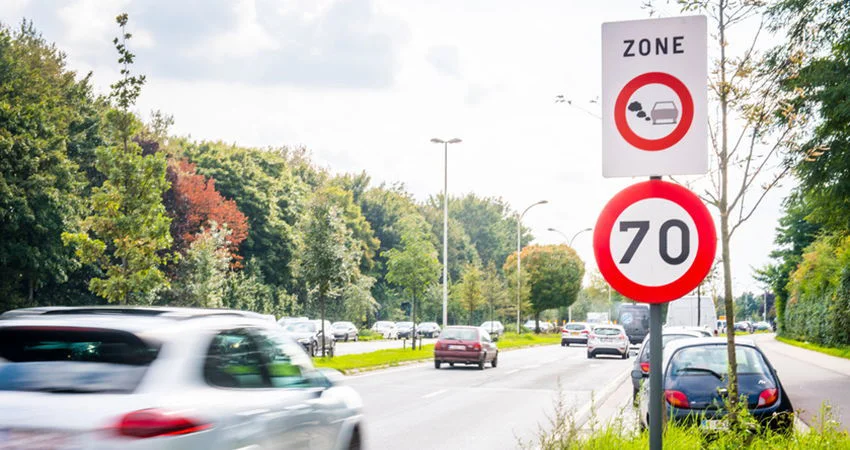
What is a Low Emission Zone?
A "Low Emission Zone" (LEZ) is a term used to denote an area where the movement of the most polluting vehicles is prohibited. This measure is implemented in many Belgian cities (Brussels, Antwerp, Ghent) and European cities to improve air quality and, consequently, the health of the population.
How to Recognize LEZ
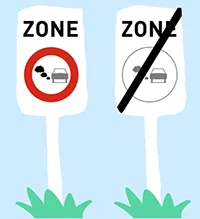 Around 300 road signs are installed at the boundaries of the LEZ to indicate that you are entering or leaving the low emission zone.
You should only enter the LEZ with vehicles that meet the entry criteria for the zone.
LEZ Map in Belgium
Around 300 road signs are installed at the boundaries of the LEZ to indicate that you are entering or leaving the low emission zone.
You should only enter the LEZ with vehicles that meet the entry criteria for the zone.
LEZ Map in Belgium
Does it Apply to Me?
The criteria for access to the Low Emission Zone (LEZ) depend on the category, fuel type, and Euro standard of the vehicle.
Currently, entry into the zone is prohibited for cars (category M1), (mini)buses (category M2),
buses and postal buses (category M3), or vans (category N1, excluding N1 vehicles with body code BC),
operating on diesel with Euro standards 0, 1, 2, 3, and 4 or petrol with Euro standards 0 and 1.
Access criteria will be strengthened in 2025.
From 01.01.2025, mopeds, motorcycles, and other light two-, three-, or four-wheeled vehicles (category L) and trucks
(categories N2, N3, and N1 with body code BC) will also be subject to the LEZ.
Permission to enter the low emission zones of the LEZ
Diesel and diesel-hybrid passenger cars
| Norm | 2024 | 2025 | 2026 | 2027 | 2028 | 2029 | 2030 | 2031 | 2032 | 2033 | 2034 |
|---|---|---|---|---|---|---|---|---|---|---|---|
| Euro 6d | ✅ | ✅ | ✅ | ✅ | ✅ | ✅ | ❌ | ❌ | ❌ | ❌ | ❌ |
| Euro 6d-TEMP | ✅ | ✅ | ✅ | ✅ | ❌ | ❌ | ❌ | ❌ | ❌ | ❌ | ❌ |
| Euro 6 b, c | ✅ | ✅ | ✅ | ✅ | ❌ | ❌ | ❌ | ❌ | ❌ | ❌ | ❌ |
| Euro 5 | ✅ | ❌ | ❌ | ❌ | ❌ | ❌ | ❌ | ❌ | ❌ | ❌ | ❌ |
| Euro 4, 3, 2, 1 | ❌ | ❌ | ❌ | ❌ | ❌ | ❌ | ❌ | ❌ | ❌ | ❌ | ❌ |
| Без Euro | ❌ | ❌ | ❌ | ❌ | ❌ | ❌ | ❌ | ❌ | ❌ | ❌ | ❌ |
Petrol, gas, hybrid passenger cars
| Norm | 2024 | 2025 | 2026 | 2027 | 2028 | 2029 | 2030 | 2031 | 2032 | 2033 | 2034 |
|---|---|---|---|---|---|---|---|---|---|---|---|
| Euro 6d | ✅ | ✅ | ✅ | ✅ | ✅ | ✅ | ✅ | ✅ | ✅ | ✅ | ✅ |
| Euro 6d-TEMP | ✅ | ✅ | ✅ | ✅ | ✅ | ✅ | ❌ | ❌ | ❌ | ❌ | ❌ |
| Euro 6 b, c | ✅ | ✅ | ✅ | ✅ | ✅ | ✅ | ❌ | ❌ | ❌ | ❌ | ❌ |
| Euro 5 | ✅ | ✅ | ✅ | ✅ | ✅ | ✅ | ❌ | ❌ | ❌ | ❌ | ❌ |
| Euro 4 | ✅ | ✅ | ✅ | ✅ | ✅ | ✅ | ❌ | ❌ | ❌ | ❌ | ❌ |
| Euro 3 | ✅ | ✅ | ✅ | ✅ | ❌ | ❌ | ❌ | ❌ | ❌ | ❌ | ❌ |
| Euro 2 | ✅ | ❌ | ❌ | ❌ | ❌ | ❌ | ❌ | ❌ | ❌ | ❌ | ❌ |
| Euro 1 | ❌ | ❌ | ❌ | ❌ | ❌ | ❌ | ❌ | ❌ | ❌ | ❌ | ❌ |
| Без Euro | ❌ | ❌ | ❌ | ❌ | ❌ | ❌ | ❌ | ❌ | ❌ | ❌ | ❌ |
You can read about other classes of cars on the website lez.brussels
Definition of the Euro norm for a passenger car
| Emission norm | Year of first registration |
|---|---|
| Euro 1 | 01.07.1992 - 31.12.1996 |
| Euro 2 | 01.01.1997 - 31.12.2000 |
| Euro 3 | 01.01.2001 - 31.12.2005 |
| Euro 4 | 01.01.2006 - 31.12.2010 |
| Euro 5 | 01.01.2011 - 31.08.2015 |
| Euro 6 | 01.09.2015 - 31.08.2019 |
| Euro 6d-TEMP | 01.09.2019 - 31.12.2020 |
| Euro 6d | 01.01.2021 - ... |
Non-compliance with LEZ Criteria
If your vehicle does not meet the Low Emission Zone (LEZ) access criteria, you can purchase a day pass and gain access to the Brussels Capital Region.
- The day pass costs 35 euros per day. It will cost 20 euros per day for mopeds and motorcycles, 50 euros per day for heavy goods transport.
- You can purchase the pass before entering the LEZ or the next day. The day pass can be purchased until midnight the day after using the LEZ. Example: if I drive through the LEZ on January 3rd with a non-compliant vehicle, I have until midnight on January 4th to buy a ticket.
- After purchasing the ticket, you need to wait for 15 minutes before you can verify that your purchase has been accounted for.
- For a vehicle, a maximum of 24 day passes can be purchased per year.
- On January 1st of each year, the day pass counter is reset.
- The day pass is valid only for the calendar day on which it was purchased and until 6 am the next day.
- You only need to purchase a day pass(!) for the day(s) you use your vehicle. Example: you arrive in Brussels on September 19th and leave on September 23rd, but leave your car in the parking lot on September 20th, 21st, and 22nd. You only need to buy two day passes: one for September 19th and one for September 23rd.
- Drivers of foreign-registered vehicles (including the Netherlands) wishing to purchase a day pass must first register their vehicle.
- Valid passes are only those purchased through the website. Passes are not issued in sticker or paper form.
Many other nuances and details, as well as alternative transportation options in the city, can be found on the Brussels Low Emission Zones website
In addition to Brussels, such zones exist in other cities in Belgium: Antwerp, Ghent, Mechelen, and Vilvoorde
Speed Limits

Standard speed limits in Belgium (unless otherwise indicated by signs).
Cars and motorcycles:- Within built-up areas – 50 km/h
- Outside built-up areas – 90 km/h
- On expressways – 120 km/h
- On motorways – 120 km/h
- Within built-up areas – 50 km/h
- Outside built-up areas – 90 km/h
- On expressways – 120 km/h
- On motorways – 120 km/h
The minimum allowed speed on motorways is 70 km/h.
In a "Residential Zone" indicated by a road sign, the speed of vehicles should not exceed 30 km/h.
Low Beam Headlights
Low beam headlights are not mandatory during daylight hours. However, low beam headlights should be turned on during the day in conditions of reduced visibility.
Cost of Petrol in Belgium
Parking in Belgium
On most central streets in cities, parking is subject to a fee. After payment, the receipt must be placed on the front windshield so that it is clearly visible from the outside.
On some streets, parking may be free but time-restricted (Blue Zone). In this case, it is necessary to place a blue cardboard clock on the front windshield, indicating the arrival time. Blue clocks can be purchased at gas stations, kiosks, and police stations.
Keep in mind that temporary signs may be placed on the left side of the road to indicate that the road must be clear for roadworks. Drivers who ignore this requirement risk having their car towed to a penalty parking lot.
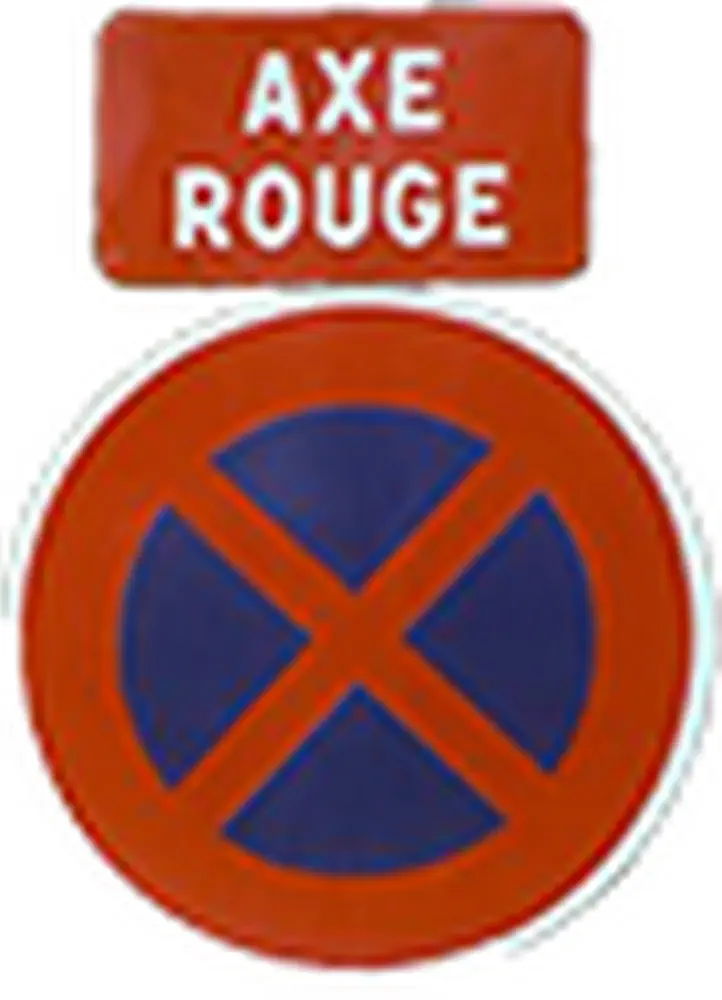 On some very busy streets, a corresponding sign (Axe Rouge/Ax Rode) may be installed, indicating that parking is not allowed from 07:00 to 09:30 and from 16:00 to 18:00.
On some very busy streets, a corresponding sign (Axe Rouge/Ax Rode) may be installed, indicating that parking is not allowed from 07:00 to 09:30 and from 16:00 to 18:00.
Street Parking in Brussels
Parking is divided into zones in Brussels, each with its own tariffs and maximum parking time.
Green Zone: unlimited time parking
Tariff:
- €0.50 for the first half-hour
- €0.50 for the second half-hour
- €2.00 for the second hour
- €1.50 for each additional hour
Gray Zone: parking allowed for a maximum of 4.5 hours
Tariff:
- €0.50 for the first half-hour
- €1.50 for the second half-hour
- €3.00 for the second hour
- €3.00 for each additional hour
Red Zone: parking allowed for a maximum of 2 hours
Tariff:
- €0.50 for the first half-hour
- €1.50 for the second half-hour
- €3.00 for the second hour
Blue Zone: free parking for up to 2 hours allowed
Wait&Ride Zone: parking allowed exclusively for one bus, maximum duration 4.5 hours
Price: €1.00 for 15 minutes
For more information about parking in Brussels, parking rules for motorcycles, buses, bicycles, you can read on the official city website brussels.be
Mandatory equipment
Equipment that must be in the car:| Reflective vest - drivers who stop in places, where stopping is prohibited, must wear a vest as soon as they leave their vehicle. Fine for non-compliance - €50. | |
| Emergency stop sign |
| First aid kit | |
| Extinguisher |
Winter Tires, Studded Tires, Chains
| The use of winter tires in Belgium is not mandatory but is recommended from October 1 to April 30 in mountainous areas. | |
| The use of chains is allowed only if the road is completely covered with snow or ice. | |
| The use of studded tires is prohibited, but in exceptional cases (under difficult weather conditions), it may be allowed from November 1 to March 31 for vehicles weighing up to 3.5 tons. Vehicles equipped with studded tires must have a speed limit sticker "60" on the rear. Speed limits for them are 90 km/h on motorways and 60 km/h on regular roads. |
 travels
travels Albania
Albania Andorra
Andorra Austria
Austria Azerbaijan
Azerbaijan Belarus
Belarus Bosnia and Herzegovina
Bosnia and Herzegovina Bulgaria
Bulgaria Croatia
Croatia Cyprus
Cyprus Czech Republic
Czech Republic Denmark
Denmark Estonia
Estonia Finland
Finland France
France Georgia
Georgia Germany
Germany Greece
Greece Hungary
Hungary Iceland
Iceland Ireland
Ireland Italy
Italy Kosovo
Kosovo Latvia
Latvia Liechtenstein
Liechtenstein Lithuania
Lithuania Luxembourg
Luxembourg Malta
Malta Moldova
Moldova Monaco
Monaco Montenegro
Montenegro Netherlands
Netherlands North Macedonia
North Macedonia Norway
Norway Poland
Poland Portugal
Portugal Romania
Romania Russia
Russia San Marino
San Marino Serbia
Serbia Slovakia
Slovakia Slovenia
Slovenia Spain
Spain Sweden
Sweden Switzerland
Switzerland Turkey
Turkey Ukraine
Ukraine United Kingdom
United Kingdom